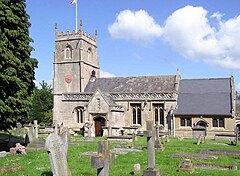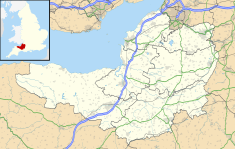Church of St Nicholas, Bathampton
| Church of St Nicholas | |
|---|---|
 | |
| Location | Bathampton, Somerset, England. |
| Coordinates | 51°23′51″N 2°19′18″W / 51.39750°N 2.32167°W |
Listed Building – Grade II* | |
| Designated | 1 February 1956[1] |
| Reference no. | 1320551 |
The Church of St Nicholas is an Anglican parish church in Bathampton, Somerset, England. It was built in the 13th century and has been designated as a Grade II* listed building.[1] The church stands between the River Avon and the Kennet and Avon Canal.
The tower was added in the 15th century. Restoration work took place in the 18th and 19th centuries. The church contains the Australia Chapel celebrating Admiral Arthur Phillip, the first Governor of New South Wales who was buried in 1814. The churchyard contains several other significant tombs.
The parish is part of the benefice of Bathampton with Claverton.[2]
History

In the 13th century John Stafford, who later became the Archbishop of Canterbury, was the vicar of Bathampton.[3]
The church has its origins in the 13th-century however during the 15th century it was altered with a chapel being added in 1500 and tower added in 1532.[4][5] In the mid 18th century Ralph Allen added Gothic components after he acquired Bathampton Manor by marriage in 1731.[6] The building was further restored and the north aisle built in 1858 by Henry Goodridge and the chancel was restored in 1882 by Charles Edward Davis.[1]
Architecture
The 3 stage west tower contains six bells,[7] two of which date from the 1540s.[8]
On either side of the main door are brass plaques which serve as War Memorials to those from the village who died in World War I and World War II.[9][10] Next to the porch is a bowl dating from medieval times which was used as the font.[11]
Australia Chapel

The "Australia Chapel" in the south aisle contains memorials to the Allen family and to Admiral Arthur Phillip, the first Governor of New South Wales.[12][13] Phillip was buried in the church after his death in 1814 and although it was unnoticed for many years, the grave was discovered in 1897 and the Premier of New South Wales, Sir Henry Parkes, had it restored. In 2007, Geoffrey Robertson QC alleged that Phillip's remains are no longer in St Nicholas Church, Bathampton and have been lost: "...Captain Arthur Phillip is not where the ledger stone says he is: it may be that he is buried somewhere outside, it may simply be that he is simply lost. But he is not where Australians have been led to believe that he now lies."[14] The windows of the sanctuary carry the coat of arms of the Federal Government and the six Australian States.[15]
Churchyard
Buried in the church yard is the body of the French aristocrat, Adolphe, Vicomte du Barry, a nephew-by-marriage and close personal friend of Madame du Barry, Louis XV's legendarily beautiful mistress. The Vicomte had been living in nearby Bath when he was killed in a duel with an Irish adventurer, Captain Rice.[16]. The artist Walter Sickert is also buried in the churchyard.
Many of the other chest tombs in the churchyard have been designated as listed buildings.[17][18][19][20][21][22][23][24]
See also
References
- ^ a b c Historic England. "Parish Church of St Nicholas (1320551)". National Heritage List for England. Retrieved 7 July 2015.
- ^ "St Nicholas Church, Bathampton". A church near you. Church of England. Retrieved 17 September 2013.
- ^ Dunning, Robert (2005). A Somerset Miscellany. Tiverton: Somerset Books. pp. 32–33. ISBN 0-86183-427-5.
- ^ Dunning, Robert (2007). Somerset Churches and Chapels: Building Repair and Restoration. Halsgrove. p. 44. ISBN 978-1841145921.
- ^ "The History of St Nicholas Church, Bathampton". St Nicholas Bathampton. Archived from the original on 17 September 2013. Retrieved 17 September 2013.
- ^ "St Nicholas' Church". Bathampton Village. Archived from the original on 19 April 2014. Retrieved 17 September 2013.
- ^ "Bathampton, Bath Branch". Bath and Wells Diocesan Association of Change Ringers. Retrieved 17 September 2013.
- ^ "Bathampton". Dove's Guide for Church Bell Ringers. Retrieved 17 September 2013.
- ^ "Bathampton War Memorial". War Memorials of Bath. Archived from the original on 17 September 2013. Retrieved 17 September 2013.
- ^ "Bathampton (St Nicholas) churchyard". Commonwealth War Graves Commission. Retrieved 17 September 2013.
- ^ Historic England. "Former font at south-west corner of porch of Parish Church of St. Nicholas (1137044)". National Heritage List for England. Retrieved 4 April 2015.
- ^ Staveley, Brian (2009). "Founding father... neglected hero" (PDF). Coast and Country (One): 96–101. Archived from the original (PDF) on 22 October 2013. Retrieved 17 September 2013.
- ^ Scott, Shane (1995). The hidden places of Somerset. Aldermaston: Travel Publishing Ltd. pp. 16–17. ISBN 1-902007-01-8.
{{cite book}}: Cite has empty unknown parameter:|coauthors=(help) - ^ Bartlett, Liam. "Lost the plot". 60 Minutes. Archived from the original on 15 October 2013. Retrieved 17 September 2013.
- ^ "Arthur Phillip 1738-1814 - First Governor of New South Wales". St Nicholas Bathampton. Archived from the original on 15 October 2013. Retrieved 17 September 2013.
- ^ Joan Haslip, Madame du Barry: The Wages of Beauty, (1992), p. 120
- ^ Historic England. "Group of 5 chest tombs to east of porch of Parish Church of St. Nicholas (1137059)". National Heritage List for England. Retrieved 4 April 2015.
- ^ Historic England. "Group of 5 chest tombs at south-east corner of Parish Church of St. Nicholas (1115197)". National Heritage List for England. Retrieved 4 April 2015.
- ^ Historic England. "Group of 3 chest tombs by north-east corner of Parish Church of St. Nicholas (1115198)". National Heritage List for England. Retrieved 4 April 2015.
- ^ Historic England. "Chest tomb, 5 yards to south-west of tower of Parish Church of St. Nicholas (1320552)". National Heritage List for England. Retrieved 4 April 2015.
- ^ Historic England. "Group of 5 chest tombs to north-east of chancel of Parish Church of St. Nicholas (1137102)". National Heritage List for England. Retrieved 4 April 2015.
- ^ Historic England. "Chest tomb 10 yards to east of south-east corner of south aisle of Parish Church of St. Nicholas (1137073)". National Heritage List for England. Retrieved 4 April 2015.
- ^ Historic England. "Group of 6 chest tombs at south-west corner of Parish Church of St. Nicholas (1115196)". National Heritage List for England. Retrieved 4 April 2015.
- ^ Historic England. "Chest tomb 20 yards to west of porch of Parish Church of St. Nicholas (1137053)". National Heritage List for England. Retrieved 4 April 2015.

